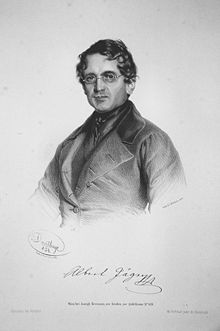Albert Hunter

Albert Jäger (born December 8, 1801 in Schwaz , † December 10, 1891 in Innsbruck ) was a Benedictine and historian . He was the founder of the Institute for Austrian Historical Research .
Life
When a fire largely destroyed Schwaz in the course of Bavarian and French rule in Tyrol in 1809 and also destroyed Albert Jäger's parents' house, the son of a master baker went to an uncle in Bolzano as an apprentice. He was supposed to learn the bakery trade, but broke off the apprenticeship and attended the humanistic Franciscan high school in Bolzano at the age of 18 . In 1825 he joined the Marienberg Benedictine Abbey in Vinschgau . A year later he started studying theology in Brixen . The ordination received Albert hunters 1829th
Appointed by his monastery as a professor at the Benedictine high school in Merano , he began his first independent research on Tyrolean local history. His first work Tyrol and the Bavarian-French invasion in 1703 made Albert Jäger famous in one fell swoop. He subsequently worked as a professor of universal and Austrian history in Innsbruck and Vienna. In 1854 the Institute for Austrian Historical Research was founded, which started operations in 1855 with Albert Jäger as director and sole teacher. The institute enjoyed a great reputation and Albert Jäger began a brilliant career at the university.
He resigned his office as director of the institute after he had been elected to the Tyrolean state parliament and as a member of the conservative church faction in the Vienna Reichsrat. With high awards from Pope Pius IX, among others . and Emperor Franz Joseph honored, he returned to Innsbruck in the 1870s and completed his life's work, the history of the Tyrolean constitution .
Since 1873 he was an honorary member of the Catholic student association AV Austria Innsbruck .
Albert Jäger was buried in his hometown Schwaz.
literature
- Constantin von Wurzbach : Jäger, Albert . In: Biographisches Lexikon des Kaiserthums Oesterreich . 10th part. Kaiserlich-Königliche Hof- und Staatsdruckerei, Vienna 1863, pp. 33–35 ( digitized version ).
- Berthold Bretholz : Jäger, Albert . In: Allgemeine Deutsche Biographie (ADB). Volume 50, Duncker & Humblot, Leipzig 1905, pp. 623-625.
- Hunter P. Albert (Josef). In: Austrian Biographical Lexicon 1815–1950 (ÖBL). Volume 3, Publishing House of the Austrian Academy of Sciences, Vienna 1965, p. 53 f. (Direct links on p. 53 , p. 54 ).
- Nikolaus Grass: Jäger, Albert. In: New German Biography (NDB). Volume 10, Duncker & Humblot, Berlin 1974, ISBN 3-428-00191-5 , p. 273 ( digitized version ).
| personal data | |
|---|---|
| SURNAME | Hunter, Albert |
| BRIEF DESCRIPTION | Austrian historian, religious and politician, member of the state parliament |
| DATE OF BIRTH | December 8, 1801 |
| PLACE OF BIRTH | black |
| DATE OF DEATH | December 10, 1891 |
| Place of death | innsbruck |
